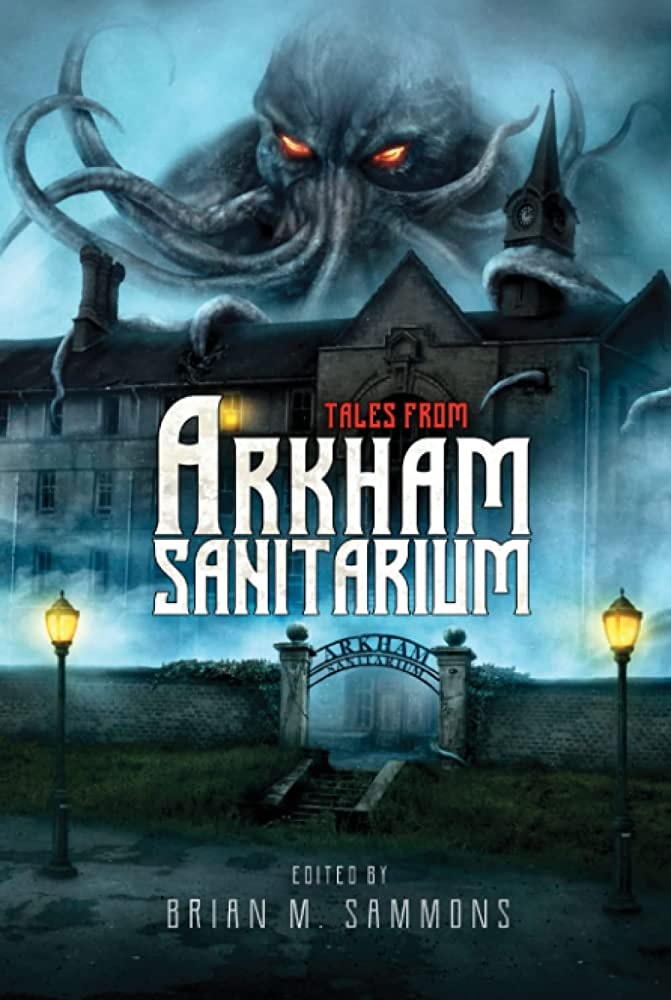A review of Tales from Arkham Sanitarium

Edited by Brian M. Sammons
208 pages
Dark Regions Press
The premise of this new collection of Lovecraftian horror is straightforward and right on point. As the Dark Regions Press blurb declares, “the insanity that follows in the pursuit of damnable truths, is at the core of many of the stories of the Cthulhu Mythos. Insanity is central to Lovecraftian horror, so there is no wonder that in his witch-cursed and legend-haunted town of Arkham, a cathedral devoted to mending broken minds was raised.” These 15 stories weave variations on that theme, although not all of them are set in the titular sanitarium. It’s obviously a theme that appeals to some highly gifted authors because the contributor list includes some of the leading lights of current weird fiction. Orrin Grey, Nick Mamatas, Cody Goodfellow and Jeffrey Thomas are anything but run-of-the-mill Lovecraft pasticheurs, and the quality of their contributions is correspondingly high.
All credit to the editor, then, for having marshalled them under this banner. Brian M. Sammons is a serial author, editor, anthologist and game designer of dark, horrific, and predominantly Lovecraftian works, and he secured all new original stories for this volume. He told me that “I’ve always liked to do unusual themes for my Lovecraftian anthologies. It’s not enough to just have good cosmic horror stories. I’ve done Lovecraftian anthologies set in the 1950s and 1960s, during wartime, in a cyberpunk future, in a steampunk past, and more… the idea behind Tales From Arkham Sanitarium was a focus on another staple of weird fiction and Lovecraftian horror: madness. I wanted stories that delved into the insanity associated with the Cthulhu Mythos, how it affects survivors and witnesses of things from beyond, how learning the things man wasn’t meant to know can burn, and how cultists and fanatics get that way. So that is what I was aiming for with this book and I think the authors nailed it.”
When the protagonists of these stories do get into Arkham Sanitarium, their ways and reasons for doing so are refreshingly different and interesting. Cosmic Microwave Background Radiation may sound like a really fantastic name for a band, but it’s far less appealing when they’re also a conduit for unnatural contagion, as in the tale by William Meikle. A talking house, or rather, a protagonist who isn’t sure whether they are a person or a house, is definitely a new one on me, but that’s what Christine Morgan manages in “Let me Talk to Sarah”. The stories from W. H. Pugmire and Joseph S. Pulver, Sr., are both among the last that those sadly-missed authors ever wrote. It’s good to be able to report that they are also among the highlights of the volume. Pulver’s story in particular is a virtuoso fantasia with his characteristic typographical and stylistic extravaganzas, almost as delirious as the subject matter, and a real reminder of how irreplaceable his talent was.
One interesting and perhaps telling aspect of the whole exercise is the frequency with which the narratives switch from Arkham Sanitarium to what appears to be almost its sister Arkham institution, Miskatonic University. Many of these sanitarium incumbents are former residents of the university, and in some cases that academic institution looms large, where the theme of madness continues but the sanitarium is hardly mentioned. As it happens, those stories include some of the strongest and weakest work in the book. Edward M. Erdelac’s “The Colors Of A Rainbow To One Born Blind” starts off as a terrific sequence of rolling evocations of favourite Lovecraftian tropes, before ending as a fairly conventional campus shooting bloodbath, all too familiar in fiction and in fact. On the other hand, Cody Goodfellow’s “Forbidden Fruit” is a disorienting exercise in seriously bad archaeology that has sunk its claws into my imagination like it wants to live there. It’s that characteristic Lovecraftian message: Knowledge leads to madness. Knowledge is madness. Madness and knowledge are two sides of the same coin. To paraphrase Lovecraft, the piecing together of dissociated knowledge has opened up such terrifying vistas of reality, and of our frightful position therein, that we have gone mad from the revelation – and the gates and cells of Arkham Sanitarium yawn wide to receive the enlightened recipients of such knowledge. Recommended.
